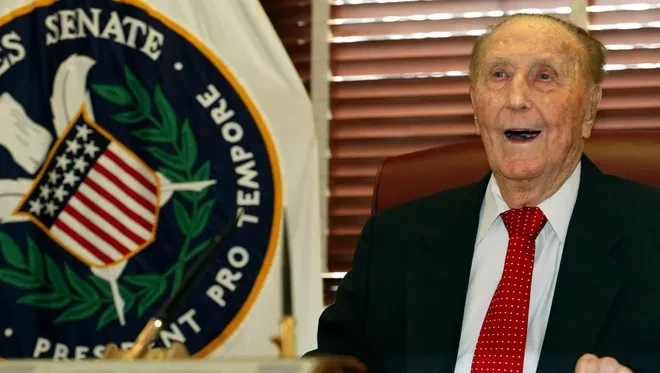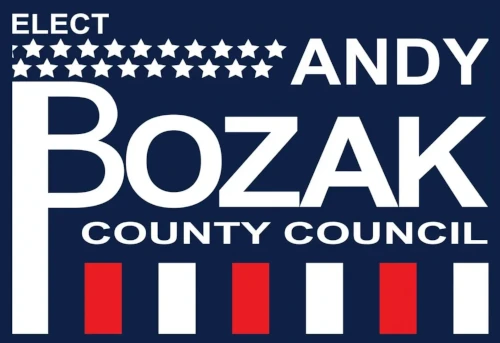Age Limit Elected Officials at 75

Sen. Strom Thurmond was 100 years
old when he died in office in 2003.
As medical technology advances,
this will only become more common.
Ageism is a form of prejudice; which is largely unfair to the elderly (as well as the young). However, the nature of American politics right now has unfortunately made it somewhat necessary. As of 2024, the average age in the US House of Representatives is just a hair under 60 years old. The average age of a US Senator is over 65. The average age of the two parties' Presidential candidates was just under 80 years. Meanwhile, the average American is only 38 years old. This is not to say the average age of our politicians should be 38 years old, but it should be closer than what it is.
The problem is that our elected officials spend more time consolidating power for themselves than they do serving their country. They do this by selling votes to the biggest donors, campaigning with massive war chests; which creates enormous name recognition and the appearance of invincibility so that no sane person would dare challenge them in a primary and hope that name recognition carries them through the general election. You would hope this wouldn't happen in our democratic society, but it does more often than not. The only way to challenge name recognition at the polls is to attack the name so that voters associate it with something negative; so that happens in virtually every election. What does not get discussed are ideas for the future, ethics, virtue, and policy details. This is a reason to support term limits, but it's also a reason to support age limits in politics.
This will have a difficult time becoming law due to the active voting group that are senior citizens in this country. Yet, it is of equal importance to term limitations because it limits the career of a career politician who bounces from one elected position to another, consolidating political power across his state and causing complete chaos when he or she does eventually die in office or finally retire.
Personal Story
In 2019, I was on the Burns Harbor, IN Town Council. If I chose to run to keep that seat on the council, I am fairly confident that I would have won despite being a Republican in a mostly Democrat union town because I was relatively well liked, news coverage had been positive, and I got along with the Democrats in town government better than they got along with themselves most of the time. However, I also knew that there was a reasonable chance that I would move out of town before my next term would be up. If this happened, I (as the Republican Precinct Committeeman for the town) and the Chairman of the Porter County Republican Party (who doesn't live in the town) would pick my replacement. This is actually how I became a Town Councilman in Burns Harbor when the person who won the election was elected to serve on the County Council. When he ran for Town Council, he had no idea he would become a County Councilman a little over a year later. Unlike him, I knew that there was a very real possibility that I wouldn't be living in town limits in four years. So I decided not to run. I thought the people of Burns Harbor deserved to elect someone who would represent them for four years and not have someone appointed halfway through the term.
The previous year, another Town Councilman, who had probably the best name recognition in the county, was diagnosed with terminal cancer. He hid his diagnosis and, despite his declining health, he put his name on the ballot in 2019. His name recognition propelled him to a colossal victory... and then he sadly died before starting his next term. The Democrat precinct committeeperson for the town and the County Democratic Chairman then picked someone to sit on the council and serve out the entirety of his four year term. Now, I don't mean to speak ill of the dead as I have a tremendous amount of respect for this man and his family. However, I felt this was a terrible injustice that denied the people of the town to vote for their representative on the town council.
Completing The Term: Another Reason for Age Limits
That personal story was meant to drive home the point that when we elect someone, we elect them to a term of usually four years, but sometimes two or six. If we limit the age of our elected officials at 75; which is to say they can last be elected at 75; it ensures that officials serving two year terms will be no older than 77, four year terms will be no older than 79, and six year terms will be no older than 81. This is still probably too old for those serving six year terms, but if the people really want to elect a person for one last term, it gives them the opportunity to do so. It also is the most fair age that recognizes that all people age differently. There are some individuals who start slowing down in their late sixties or early seventies. Some stay sharper for longer. However, in general, I think it's fair to say that everyone starts slowing down when they get to be around 80.
We used to be able to rely on politicians dying before they got to this point; but the United States of America has the best quality healthcare in the world and our political class have access to the very best of that best quality in the world: healthcare to which most Americans will never be able to afford access. It's becoming freakishly common for our former political leaders to live into their late 90s and 100s. As medical technology improves, it would not be surprising to see more politicians start pushing their careers into their 90s (like Senator Robert Byrd D-WV) or even 100s (like Senator Strom Thurmond R-SC) in the coming decades. The system is broken enough without letting the same people who broke it stay in office even longer.
The United States needs both Term Limits and Age Limits on our elected officials.
History of My Thoughts on This Issue
When I was younger and more idealistic, I believed the people should have the right to elect whoever they wanted to office. I would have argued that if the people wanted a career politician serving his tenth term in the US Senate, then the people should be able to elect him to his tenth term.
The events in the personal story from 2019 above made me begin reconsider this issue. At a certain age, there is less certainty that an elected official will be able to serve out the remainder of the term they were elected to. In fact, there is a point where it becomes more likely than not that the elected official will not be able to complete the term.
However, even if advances in healthcare and cooperative genetics make centenarian life more probable, there is another factor that I had not considered in my more idealistic youth. Specifically, the laziness of many American voters (voters who vote only on name recognition) and the ability of elected officials to consolidate power by collecting favors and getting their people elected or positioned in the right jobs throughout their state government in order to keep them in perpetual power.
This also then raises the issue of term limits; my position on which has similarly changed since 2019.







